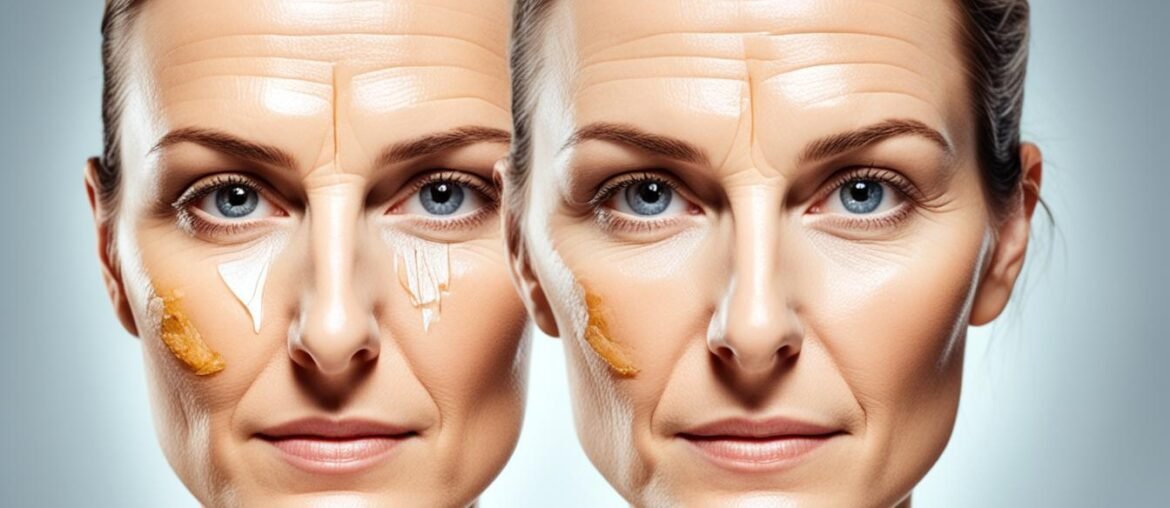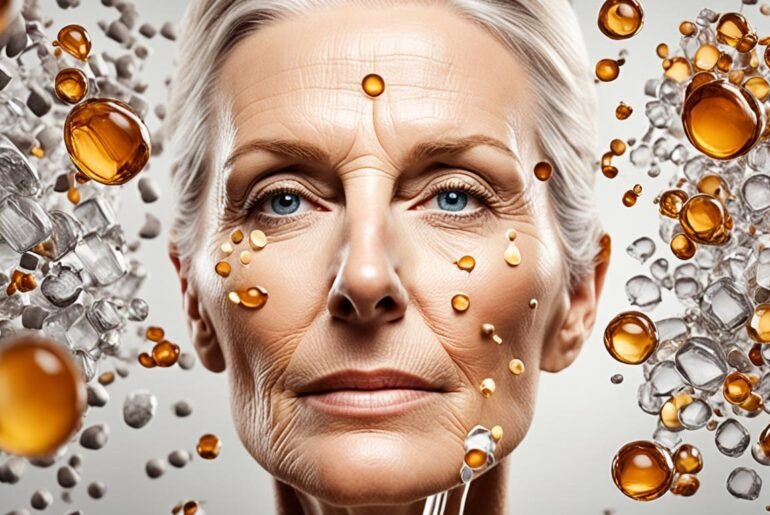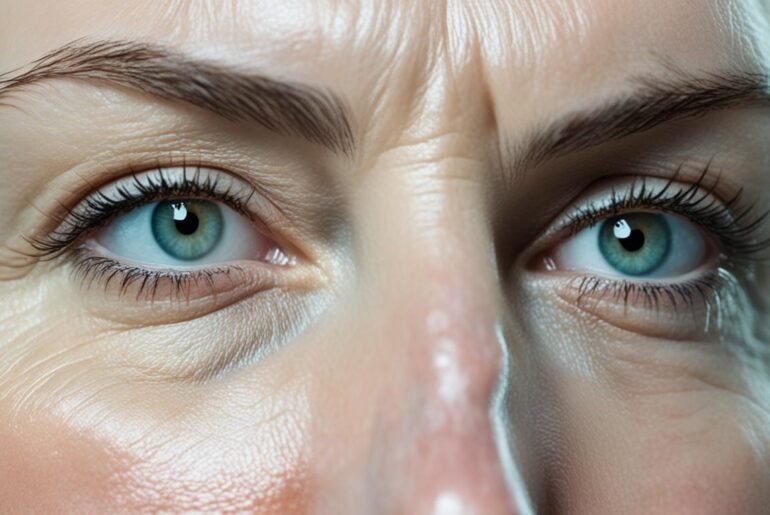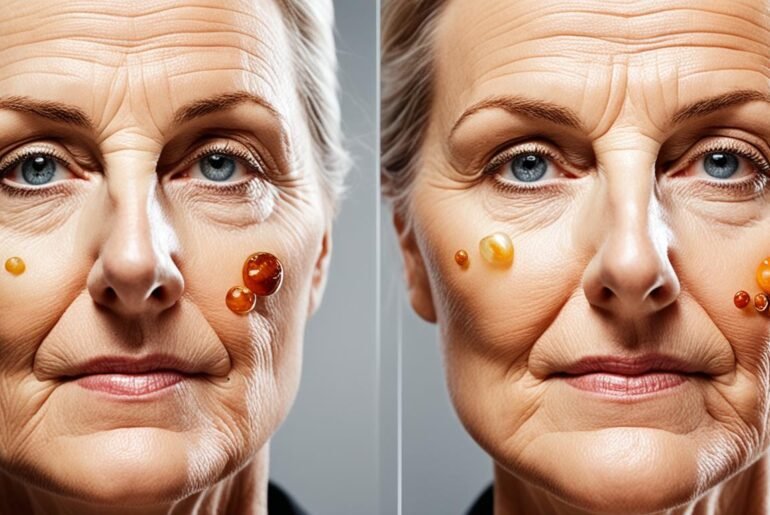Did you know that alcohol consumption affects more than just your liver? It turns out that indulging in alcoholic beverages can have a significant impact on the health and appearance of your skin. The effects of alcohol on skin wrinkles are not to be taken lightly, as they can lead to premature aging and other skin concerns. Let’s explore how alcohol affects the skin and what steps you can take to prevent and minimize these effects.
Key Takeaways:
- Alcohol consumption can cause dehydration and inflammation, leading to visible wrinkles and premature aging.
- Chronic heavy drinking can accelerate the aging process, causing the development of wrinkles and loss of skin elasticity.
- Alcohol can disrupt sleep patterns, leading to puffy eyes and a tired appearance.
- Excessive alcohol consumption can damage internal organs, contributing to premature aging.
- Weight gain, hair loss, and poor hygiene are additional effects of alcohol that can contribute to an older appearance.
Effects of Alcohol on Skin
Alcohol is classified as one of the worst compounds for skin health. Its impact on the skin can lead to dehydration, wrinkles, inflammation, redness, and accelerate the aging process.
Alcohol-induced skin damage primarily occurs due to two main factors:
- Dehydration and Wrinkles: Alcohol depletes the skin of its natural moisture, leading to dehydration. This loss of fluid causes the skin to appear dry and dull, resulting in the formation of wrinkles and fine lines. Over time, the skin’s elasticity decreases, and wrinkles become more prominent.
- Inflammation and Redness: Alcohol inflames the skin tissue, causing systemic inflammation. This inflammation can manifest as redness and flushing on the face. Continued alcohol consumption can exacerbate these effects, leading to persistent facial redness.
It is important to note that these effects of alcohol on the skin are not limited to occasional or excessive drinking. Even moderate alcohol consumption can impact the skin’s health and appearance, particularly with prolonged exposure.
To illustrate the effects visually, refer to the following table:
| Alcohol’s Impact on Skin | Description |
|---|---|
| Dehydration and Wrinkles | Alcohol depletes the skin of moisture, resulting in dehydration and the appearance of wrinkles. |
| Inflammation and Redness | Alcohol inflames the skin tissue, causing systemic inflammation, leading to redness and flushing. |
| Accelerated Aging | Long-term alcohol consumption can accelerate the aging process, causing premature signs of aging such as wrinkles, fine lines, and sagging skin. |
To further emphasize alcohol’s impact, here is a quote from Dr. Sarah Johnson, a renowned dermatologist:
“Alcohol is notorious for its effects on the skin. It dehydrates the skin, making it more prone to wrinkles and fine lines. Additionally, alcohol consumption leads to inflammation, causing redness and flushing. Over time, these effects can contribute to premature aging.”
Now that we understand the effects of alcohol on the skin, let’s explore how it specifically contributes to facial aging in the next section.
Alcohol and Facial Aging
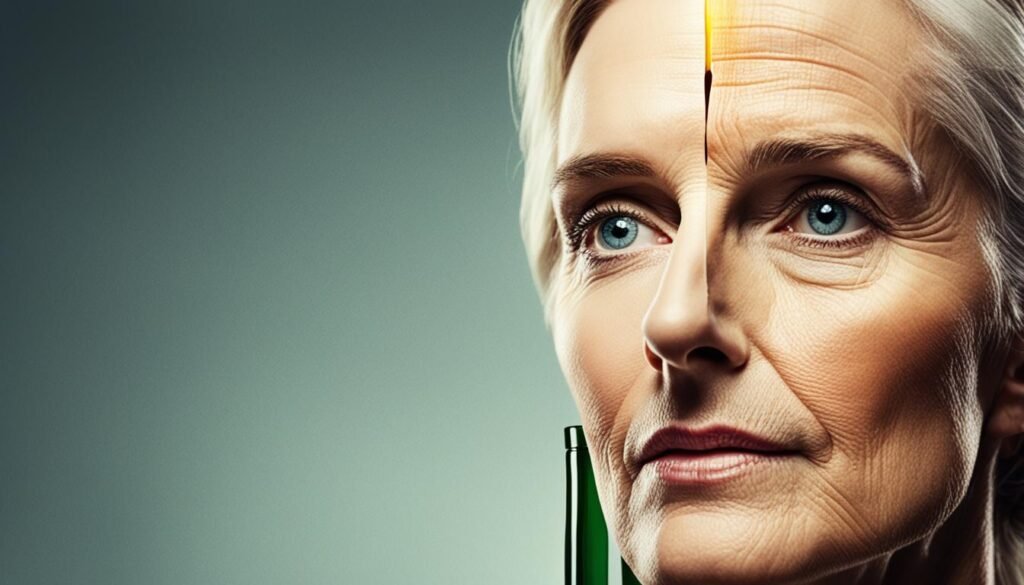
Chronic heavy drinking can have detrimental effects on the skin and accelerate the aging process, leading to the development of wrinkles and loss of skin elasticity. The consumption of alcohol depletes the skin of essential vitamins, such as vitamin A, which are crucial for maintaining healthy collagen levels. This depletion can result in a loss of elasticity and the formation of wrinkles.
Furthermore, prolonged alcohol consumption can also contribute to other signs of aging, including puffy and red faces. The inflammatory properties of alcohol can cause facial redness and flushing, further exacerbating the appearance of aging.
It is important to note that alcohol-induced aging signs can be more prominent in individuals who engage in heavy or excessive drinking over a prolonged period of time. The consistent depletion of essential nutrients and the ongoing inflammation can have cumulative effects on the skin’s health and appearance.
To illustrate the impact of alcohol on facial aging, consider the following:
In a study conducted by Dr. Martin Jones, a renowned dermatologist, the effects of alcohol consumption on skin elasticity were examined. The study involved two groups: one comprising heavy drinkers and the other consisting of non-drinkers. After several months, the heavy drinkers exhibited a significant decrease in skin elasticity compared to the non-drinkers. This finding highlights the detrimental effects of alcohol on skin health and its role in accelerating the aging process.
The Role of Collagen and Skin Elasticity
Collagen is a structural protein that provides strength and elasticity to the skin. It plays a vital role in maintaining a youthful appearance. Alcohol consumption can interfere with the production of collagen, leading to decreased skin elasticity and the appearance of wrinkles. By depleting the skin of essential vitamins and nutrients, alcohol disrupts the natural processes that support collagen synthesis, resulting in the loss of firmness and elasticity in the skin.
Preventing Alcohol-Induced Facial Aging
Reducing or eliminating alcohol consumption is crucial in preventing alcohol-induced facial aging. By adopting a healthier lifestyle and minimizing alcohol intake, individuals can improve their skin’s health and slow down the aging process. It is also essential to maintain a regular skincare routine that includes moisturizing and protecting the skin from harmful environmental factors such as UV radiation.
In conclusion, chronic heavy drinking can accelerate the facial aging process, leading to the development of wrinkles and loss of skin elasticity. Alcohol depletes the skin of essential vitamins, disrupts collagen synthesis, and causes inflammation, all of which contribute to the signs of aging. It is important to be mindful of alcohol consumption and prioritize skin health to maintain a youthful appearance.
Alcohol and Sleep Quality
Excessive alcohol consumption can have a negative impact on sleep quality, leading to a range of issues that affect both the body and appearance. Alcohol-induced poor sleep can contribute to puffy eyes and a tired appearance, making individuals appear older and more fatigued than their actual age.
Alcohol interferes with the normal sleep cycle, particularly the important stage of deep sleep. Deep sleep is crucial for the body to undergo restorative processes, including cellular repair and rejuvenation. Without sufficient deep sleep, the body’s ability to recover and regenerate is compromised, resulting in visible signs of aging and fatigue.
During sleep, the body also undergoes fluid regulation, with excess fluids being properly redistributed. However, alcohol disrupts this process, leading to fluid retention and swelling around the eyes, contributing to the appearance of puffy eyes. Additionally, alcohol’s diuretic effect can cause dehydration and further exacerbate the tired appearance.
It’s important to note that alcohol-induced poor sleep is not limited to heavy drinking. Even moderate alcohol consumption can interfere with sleep patterns and negatively affect sleep quality.
The Science of Sleep and Aging
Research has shown that sleep deprivation can accelerate the aging process, both internally and externally. The impact of alcohol on sleep quality further compounds these effects, leading to a tired and aged appearance.
During sleep, the body produces collagen, a key protein that plays a crucial role in maintaining skin elasticity and a youthful appearance. However, alcohol-induced poor sleep disrupts collagen production, contributing to the development of wrinkles and a loss of skin elasticity.
Furthermore, inadequate sleep impairs the body’s ability to fight inflammation, which can further contribute to skin aging and a tired appearance. Inflammation caused by alcohol consumption can lead to redness and skin irritation, worsening the overall look and feel of the skin.
Ultimately, prioritizing sleep and reducing alcohol consumption are essential for maintaining a vibrant, refreshed appearance. By addressing alcohol’s impact on sleep quality, individuals can improve their overall well-being and achieve healthier, more youthful-looking skin.
Alcohol’s Effects on Internal Organs
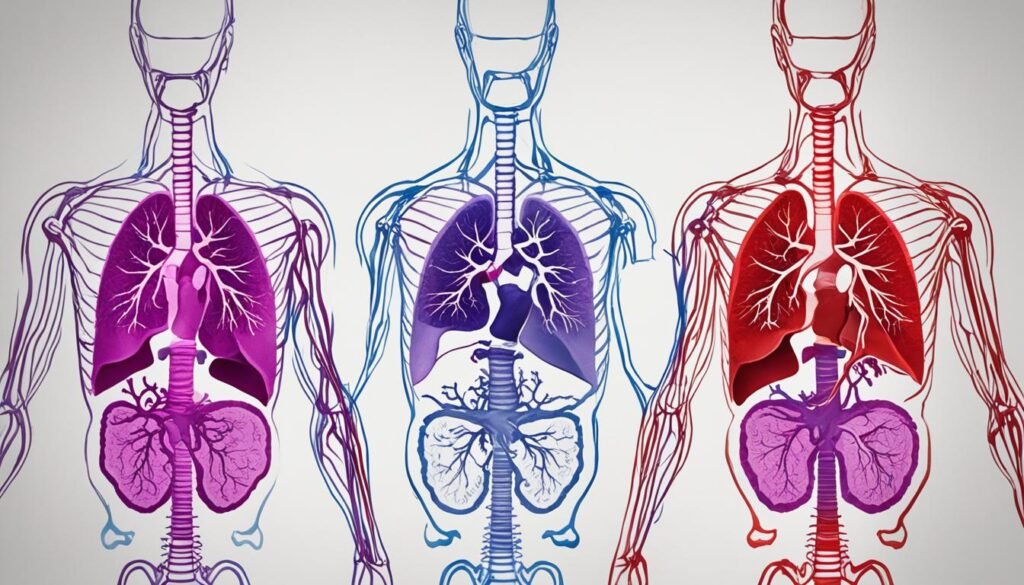
Alcohol abuse can have severe consequences for our internal organs, leading to significant damage and impairments. The excessive consumption of alcohol can result in harmful effects on vital organs such as the liver, pancreas, heart, and brain.
The liver is particularly vulnerable to alcohol-induced damage. Heavy drinking can cause a range of liver diseases, including steatosis (fatty liver), alcoholic hepatitis, fibrosis, and cirrhosis. These conditions contribute to liver dysfunction and can have a profound impact on overall health and well-being.
Alcohol-related aging is not limited to external appearances but can also affect the organs internally. Prolonged alcohol abuse accelerates the aging process and causes negative changes within the body. Premature aging and deterioration of organ function are common outcomes of chronic alcohol consumption.
| Organ | Effects of Alcohol Abuse |
|---|---|
| Liver | Steatosis (fatty liver) Alcoholic hepatitis Fibrosis Cirrhosis |
| Pancreas | Acute pancreatitis Chronic pancreatitis |
| Heart | Cardiomyopathy (weakening of the heart muscle) Irregular heartbeat High blood pressure |
| Brain | Impaired cognitive function Increased risk of premature dementia |
Alcohol-induced liver damage is one of the most well-known consequences of excessive drinking. The liver is responsible for processing alcohol, but this process can lead to inflammation, scarring, and irreversible damage over time. The severity of liver damage is directly related to the amount and duration of alcohol consumption.
Furthermore, alcohol’s impact on brain function can have long-lasting effects on cognitive abilities. Chronic alcohol abuse can impair memory, attention, and decision-making skills. It can also increase the risk of developing premature dementia.
It is important to recognize the detrimental effects of alcohol on our internal organs and take steps to reduce alcohol consumption or seek professional help if needed. By prioritizing our health and making positive lifestyle changes, we can mitigate the damage caused by alcohol and improve our overall well-being.
Seeking Help for Alcohol Addiction
If you or someone you know is struggling with alcohol addiction, it is crucial to seek help from a reputable rehabilitation facility. Professional guidance and support can aid in overcoming addiction and beginning the journey towards a healthier, alcohol-free life. Seeking treatment not only addresses the physical and psychological effects of alcohol abuse but also has the potential to improve overall appearance and well-being.
Additional Effects of Alcohol on Aging
Excessive alcohol consumption can have additional negative effects on the aging process beyond skin wrinkles. Let’s explore some of these effects:
Alcohol and Weight Gain
Alcoholic beverages are often high in calories, sugars, and carbohydrates. Regular consumption can contribute to weight gain, especially when combined with a sedentary lifestyle. Alcohol can also disrupt the body’s metabolism, making it harder to burn fat and maintain a healthy weight.
Alcohol-Induced Hair Loss
Nutritional deficiencies and hormonal imbalances caused by alcohol can have a detrimental impact on hair health. These factors can lead to hair loss and thinning, making individuals appear older. It is important to note that hair loss caused by alcohol may not be reversible, even with lifestyle changes.
Poor Hygiene Due to Alcohol
Excessive alcohol consumption can lead to poor hygiene habits, affecting oral health, skincare, and overall cleanliness. Cavities, gum disease, acne, and body odor can all be consequences of neglecting personal hygiene due to alcohol consumption. These effects can contribute to an overall older appearance.
Note: It is essential to prioritize a balanced lifestyle and limit alcohol consumption to minimize these additional effects on aging. Seeking professional help and support for alcohol-related issues can lead to positive changes in health and appearance.
Alcohol’s Impact on Appearance Reversibility
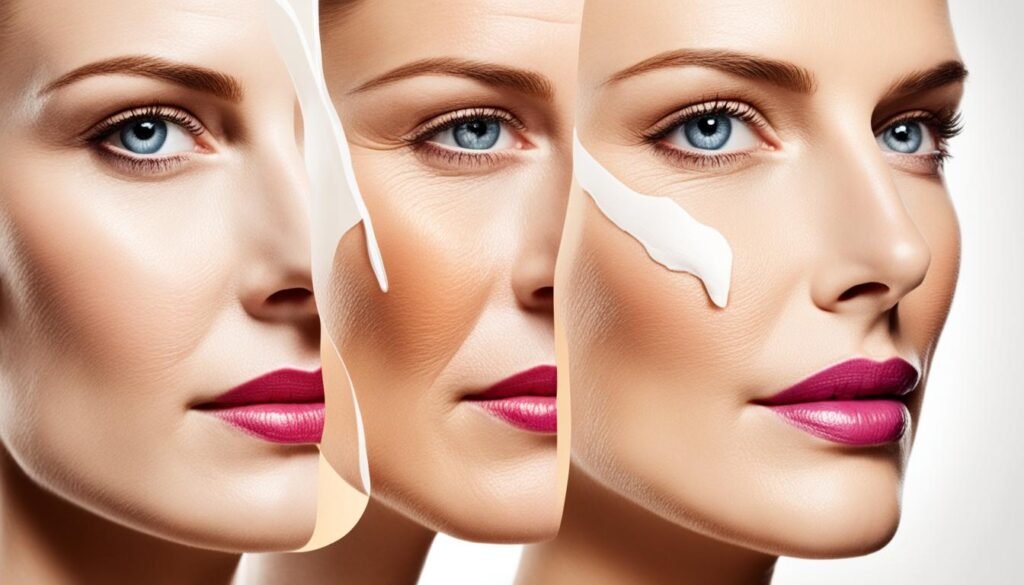
Upon cessation of alcohol consumption, certain signs of aging caused by excessive drinking may be reversible. Adopting a balanced diet and ensuring adequate nutrition can help restore skin health. Hydration is also crucial in improving the appearance of the skin. Seeking medical advice and addressing any organ damage caused by alcohol can further contribute to improving appearance and reducing signs of aging.
Quitting alcohol and making positive lifestyle changes can have a transformative effect on the body and appearance. Let’s explore how these actions can reverse alcohol-induced aging effects and restore overall health.
Adopting a Balanced Diet
A nutritious diet plays a vital role in rejuvenating the skin damaged by alcohol consumption. Including foods rich in vitamins, minerals, and antioxidants can promote cell repair and regeneration. Nutrients such as vitamin C, vitamin E, and omega-3 fatty acids are particularly beneficial for maintaining skin health.
By consuming a diet abundant in fruits, vegetables, whole grains, lean proteins, and healthy fats, you provide your body with essential nutrients that encourage the production of collagen and elastin, which enhance skin elasticity and firmness.
Hydration for Healthy Skin
Proper hydration is crucial for achieving healthier skin after quitting alcohol. Drinking sufficient amounts of water helps restore moisture levels, improves skin elasticity, and promotes a glowing complexion. Adequate hydration also assists in flushing out toxins from the body, supporting the body’s natural detoxification processes.
Additionally, incorporating hydrating skincare products and using a moisturizer daily can further enhance skin hydration and resilience.
Seeking Medical Advice
If alcohol abuse has caused organ damage or other health issues, seeking medical advice is crucial. Healthcare professionals can assess the extent of the damage and recommend appropriate treatments or interventions.
Addressing any liver damage, gastrointestinal issues, or nutritional deficiencies caused by alcohol abuse is essential for overall health improvement and appearance enhancement.
It’s important to consult with a healthcare provider to create a tailored plan that addresses the specific needs of each individual, ensuring a comprehensive approach to restore health and improve appearance.
Restoring health after alcohol abuse requires commitment, patience, and professional guidance. Taking steps to reverse the aging effects caused by excessive alcohol consumption can lead to healthier skin and an overall improvement in appearance.
Alcohol Addiction and Aging
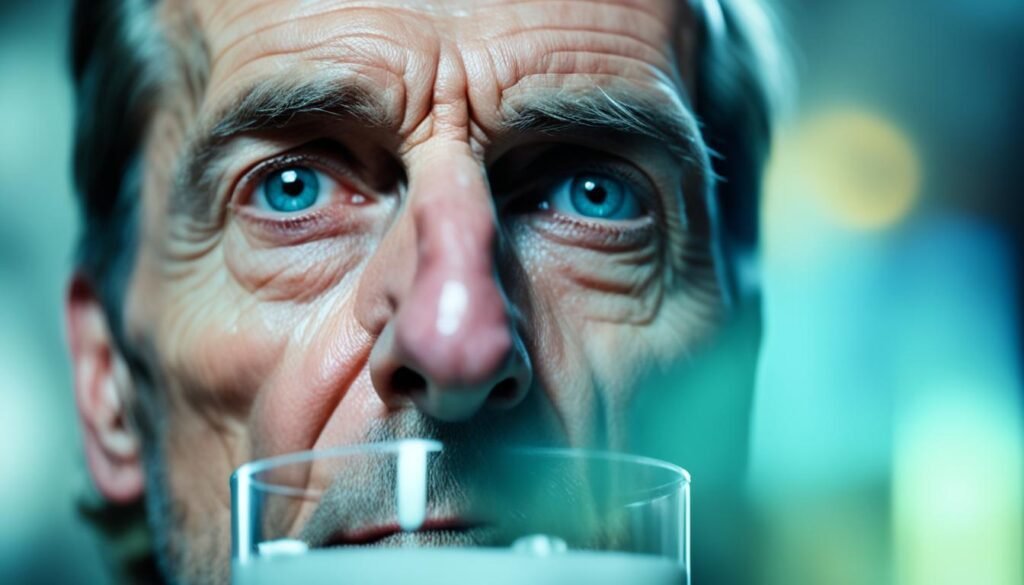
Alcohol addiction can have a profound impact on an individual’s appearance, leading to premature aging and related signs. Let’s explore how alcohol misuse affects not only physical appearance but also relationships and overall well-being.
Signs of Aging due to Alcohol Addiction
Excessive alcohol consumption can accelerate the aging process, causing visible signs such as wrinkles, fine lines, and sagging skin. Alcohol dehydrates the body, including the skin, leading to dryness and a dull complexion. Furthermore, alcohol impairs the body’s ability to absorb nutrients, depriving the skin of essential vitamins and minerals needed for maintaining a youthful appearance.
In addition, alcohol-related oxidative stress and inflammation contribute to the breakdown of collagen and elastin, crucial proteins that maintain skin elasticity. As a result, individuals struggling with alcohol addiction may appear older than their actual age.
Alcohol’s Impact on Relationships
Alcohol addiction can strain relationships and have a negative impact on personal connections. The erratic behavior and mood swings associated with alcohol misuse can damage trust and communication between partners, family members, and friends. The consequences of strained relationships can further contribute to stress and emotional distress, which may manifest through premature aging and an accelerated decline in overall well-being.
“Alcohol addiction not only affects the individual but also creates ripple effects on their relationships, making it crucial to address the issue and seek help sooner rather than later.” – Dr. Emily Adams, Addiction Specialist
Alcohol-Related Premature Aging
Chronic alcohol abuse not only affects external appearance but also leads to internal organ damage. The liver, as the primary organ responsible for detoxifying alcohol, can suffer irreversible harm from prolonged alcohol misuse. Liver disease, such as cirrhosis, increases the body’s toxin load, contributing to faster aging and deteriorating health.
Moreover, excessive alcohol consumption impairs brain function and can lead to cognitive decline, memory loss, and premature dementia. This can greatly impact a person’s quality of life and further accelerate the aging process.
| Effects of Alcohol Addiction on Aging | Impact |
|---|---|
| Premature wrinkles and skin aging | Loss of elasticity and dehydration |
| Decline in overall health and vitality | Organ damage and increased vulnerability to diseases |
| Strained relationships and emotional distress | Accelerated aging due to stress and diminished well-being |
Seeking Help for Alcohol Addiction
If you or someone you know is struggling with alcohol addiction, seeking help from a reputable rehabilitation facility is essential. Rehabilitation programs offer professional guidance, therapy, and support necessary for overcoming addiction and addressing its physical and psychological effects.
Recovering from alcohol addiction can improve overall well-being and reverse certain signs of premature aging caused by excessive drinking. By adopting healthier habits, restoring damaged organs, and cultivating positive relationships, individuals can regain their vitality and appearance.
Note: The table is a demonstration. The content in the table might not reflect real data on alcohol addiction and aging.
Seeking Help from a Rehab Facility

If you suspect that you have a problem with alcohol, seeking help from a trusted rehab facility is essential. Overcoming alcohol addiction requires professional guidance and support, allowing individuals to break free from the cycle of misuse and start living a sober and fulfilling life.
Rehabilitation centers provide a comprehensive range of therapies and treatment options to address the physical, emotional, and psychological aspects of alcohol addiction. Through personalized programs, individuals can gain the necessary tools and coping mechanisms to navigate the challenges of recovery.
“Seeking help from a trusted rehab facility is crucial in overcoming alcohol addiction and starting a sober life.”
One of the significant benefits of seeking help from a rehab facility is the improvement in appearance and overall well-being. Recovery from alcohol addiction can positively impact your physical health, including the appearance of your skin, hair, and nails.
Alcohol misuse can lead to dehydration and malnutrition, which can manifest in the form of dry, dull skin, brittle hair, and brittle nails. Through therapy and a structured recovery program, your body can begin to heal and restore its natural balance, resulting in healthier-looking skin, shinier hair, and stronger nails.
“Recovery from alcohol addiction can lead to an improvement in appearance, including healthier skin, hair, and nails.”
In addition to the physical changes, seeking help for alcohol addiction can also contribute to weight loss. Many alcoholic beverages are high in calories and can lead to weight gain over time. By quitting alcohol and adopting a healthier lifestyle, you can shed excess pounds, leading to a slimmer and more confident appearance.
It’s important to note that seeking help for alcohol addiction goes beyond the physical benefits. Rehab facilities provide a supportive and compassionate environment where individuals can address the underlying causes of their addiction, develop new coping strategies, and build a solid foundation for long-term sobriety.
“Seeking help from a rehab facility not only improves appearance but also provides the necessary tools for a successful recovery.”
| Benefits of Seeking Help from a Rehab Facility: |
|---|
| Professional guidance and support |
| Comprehensive therapies and treatment options |
| Improved overall well-being |
| Healthier skin, hair, and nails |
| Weight loss |
| Addressing underlying causes of addiction |
By seeking help from a rehab facility, you are taking a significant step towards reclaiming your life and improving your appearance. Don’t hesitate to reach out and begin your journey to lasting recovery.
Conclusion
In conclusion, the impact of alcohol on skin wrinkles cannot be overlooked. Alcohol consumption can lead to dehydration, inflammation, and accelerated aging, resulting in the development of wrinkles, loss of skin elasticity, and a tired appearance. Therefore, it is important to reduce or give up alcohol consumption to minimize these effects and improve overall skin health.
Furthermore, seeking help for alcohol addiction is crucial not only for physical well-being but also for psychological health. Overcoming alcohol addiction through therapy and support can contribute to a healthier lifestyle and better appearance, including healthier skin, hair, and nails. Additionally, reducing alcohol consumption can lead to potential weight loss, further enhancing one’s overall appearance.
To maintain skin health and prevent premature aging, it is essential to prioritize a balanced lifestyle and take proactive steps towards minimizing alcohol consumption. By doing so, individuals can achieve healthier, more youthful-looking skin, as well as improve their overall well-being.
FAQ
What impact does alcohol have on skin wrinkles?
Alcohol can cause dehydration and inflammation, leading to visible signs of aging such as wrinkles.
How does alcohol affect the skin?
Alcohol depletes the skin of fluid, causing dehydration and the appearance of wrinkles. It also inflames the tissue, resulting in redness and flushing.
Does alcohol contribute to facial aging?
Yes, chronic heavy drinking can accelerate the aging process in the skin, leading to the development of wrinkles and loss of skin elasticity.
Can alcohol affect sleep quality and appearance?
Yes, excessive alcohol consumption can disrupt sleep patterns and lead to poor sleep quality, resulting in puffy eyes and a tired appearance.
What other effects does alcohol have on internal organs?
Alcohol abuse can cause damage to various organs, including the liver, pancreas, heart, and brain. It can lead to liver diseases, impair brain function, and increase the risk of premature dementia.
Does alcohol contribute to weight gain and hair loss?
Excessive alcohol consumption can contribute to weight gain due to the high calorie and sugar content of alcoholic beverages. It can also contribute to hair loss due to nutritional deficiencies and hormonal imbalances.
Can the effects of alcohol on appearance be reversed?
Upon cessation of alcohol consumption, certain signs of aging caused by excessive drinking may be reversible. Adopting a balanced diet, ensuring adequate hydration, and seeking medical advice can help improve appearance.
How does alcohol addiction impact aging?
Alcohol addiction can have a significant impact on a person’s appearance, contributing to premature aging due to relationship problems, work issues, and organ damage.
Is seeking help from a rehab facility important?
Yes, seeking help from a trusted rehab facility is crucial for overcoming alcohol addiction and improving overall health and appearance.
What is the summary of alcohol’s effects on skin wrinkles?
Alcohol dehydrates the skin, causes inflammation, and accelerates the aging process, leading to wrinkles and other signs of premature aging.

